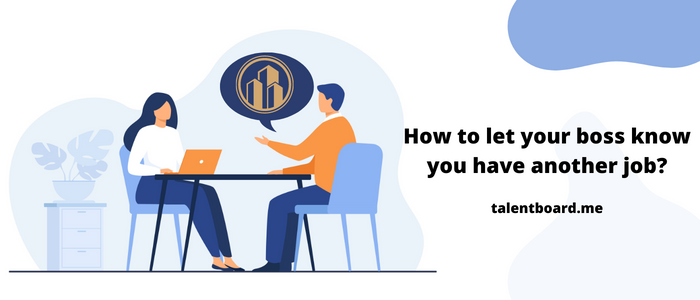Have you ever wondered how employees get caught working at two different jobs? Even when the business policy permits employees to hold two jobs, we know that the possibility of being discovered is unsettling.
So how to find out if an employee has a second job? and how to tell your boss about it when you have a side job.
We investigated several cases in which employees were found to be working in two different occupations simultaneously.
The unifying thread here is that these moonlighting employees with less cunning were discovered through unexpected and shared connections.
These shared ties are not what you might expect them to be.
Employers or HR do not always find out; instead, it is friends, coworkers, daycare parents, clients, or some third party who becomes jealous of you and decides to report your employers.
How to find out if an employee has a second job?

The global community is now much more manageable, thanks to the Internet.
According to data published by Facebook, just three and a half steps separate us from any other person on the planet. It does not appear as though there will be much separation.
There is a possibility that these intimate relationships exist, but it is not a simple task to determine who exactly they are.
You would have to add everyone as a friend and actively look for connections between you all. In this particular scenario, we aim to reduce the number of occurrences that could result in detecting a typical relationship.
Do you have to tell your employer about your second job?
It is not against the law to have a second job; however, you need to consider several things to ensure that you do not jeopardize your primary source of income.
One of these things is the tax implications of having a second job. Getting a second job can be a good (or even necessary) thing to do.
When you have more than one job, it’s not always easy to decide whether or not you should tell your current employer about your other employment.
When it comes to most part-time work, this isn’t a particularly colossal matter; nevertheless, it can be a sensitive and important issue to discuss in certain circumstances.
It is in your best interest to discuss the other jobs you hold with your current employers, significantly if the schedules of the current positions vary from week to week.
Because of this, you will be able to coordinate your different shifts to prevent them from overlapping or running too close to one another.
This is of utmost significance if one of your employments adheres to a somewhat strict timetable or asks you to work past your average quitting time occasionally.
Should I even bring it up to be discussed?
What happens if your contract doesn’t include a clause prohibiting you from working for a competitor? What if your gigs are on separate days, and you have no trouble fitting them into your schedule?
If this is the situation, you are not required to discuss your other jobs with your current employer if you don’t want to. It is acceptable not to bring it up at the workplace because it does not directly affect anything there.
If you choose to inform your employer, you should avoid making a big issue out of the situation. This could potentially lead to a contentious conversation.
You might instead bring it up in conversation or bring it up in a casual way while passing the time.
There is typically no reason for concern when discussing the previous jobs you have previously held. We sincerely hope this information has provided you with the tools you need to determine whether you should mention it at your employment.
How to let your boss know you have another job?
In either case, it could be a challenging choice. On the one hand, you don’t want your employer to feel that you aren’t fully dedicated to your work.
On the other hand, you don’t want to put your employer’s faith in you in danger if they discover your side occupations through some other means.
The reality is that there are quite a few circumstances that strongly imply that you should surely tell your supervisor about any additional employment that you are working on the side.
It is not merely a matter of whether or not your employer tells you that you are required to do so.
If any of the following describe your situation, communicating this information to your employer is most likely the best course of action.

When you definitely should tell your company
- If this is stated in your employee handbook or employment contract
When contracts state that you can’t have another means of work, especially if your “job” is more of a passion project than a business, things might get a little murkier than they might otherwise be (for now).
- If you think that your side job might create a conflict of interest
Your day job may suffer from a conflict of interest if your job involves providing digital marketing services when a marketing firm also employs you.
- If they are going to discover it regardless.
Make a positive impression on others by informing them before they inform you, even if it is not required.
- If you have a good relationship with your manager
Nobody knows your relationship with your boss better than you, and no one else will ever know it. But if you believe that it could lead to stress or concealment if they found out, we recommend that you be straightforward and share it.
How to deal with it
There are a few different approaches that you might use when notifying your manager about it. Again, this approach will primarily depend on your workplace’s culture, your relationship with your boss and coworkers, and the type of extra work you do.
- Have a friendly chat over coffee with your boss.
- Make a formal appointment with the human resources department.
If you work for a large and established organization, talking to someone in the HR department is probably the best place to start looking for answers. This may be beneficial for you, your boss, and your organization as a whole.